_ Spring season 2023
Module I | 13-19 May
Mentor: Noor Abed
![]() Guests:
Guests:Felipe Steinberg
Participants:Evagoria Dapola
Module I | 13-19 May
Mentor: Noor Abed
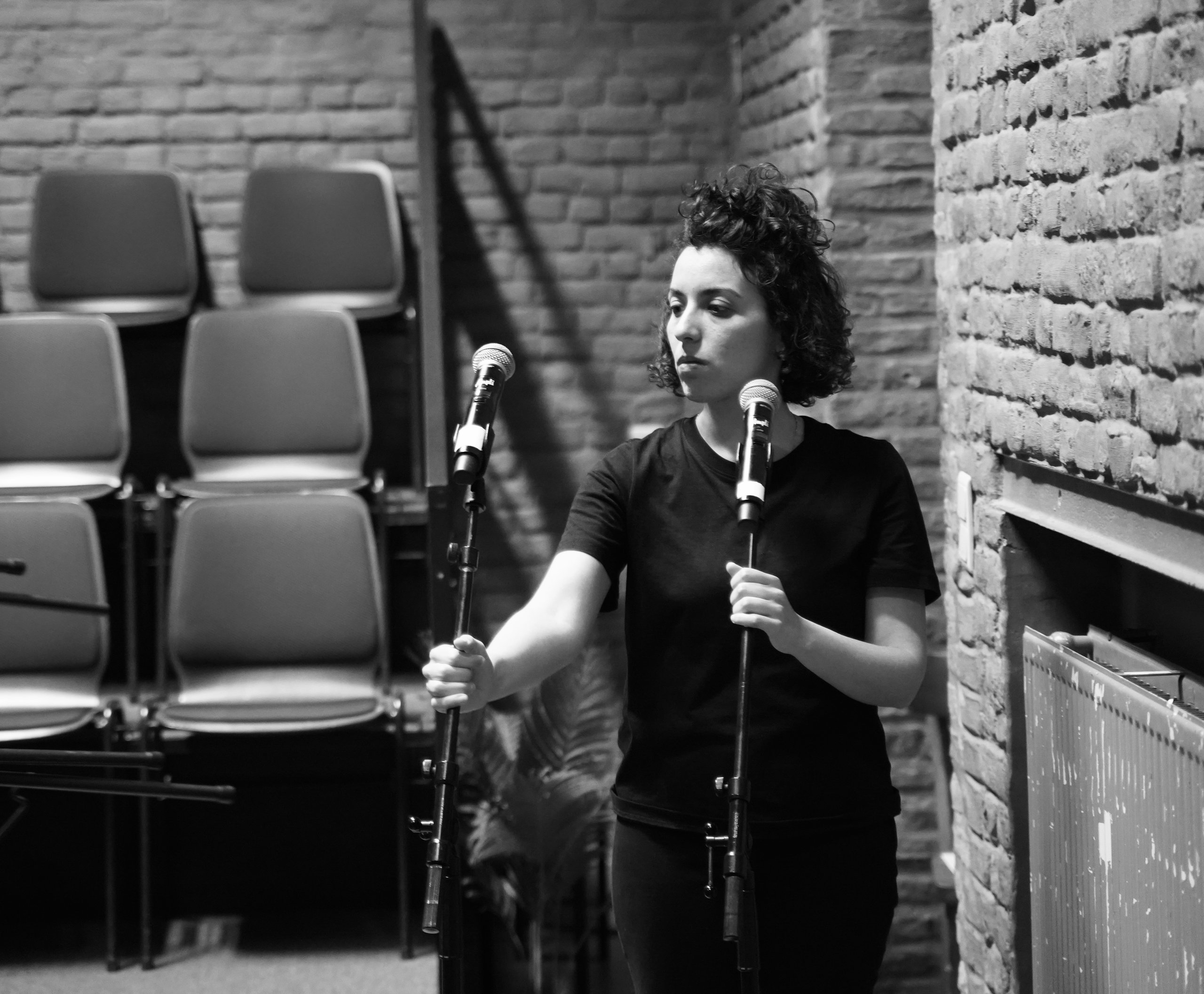 Guests:
Guests:Felipe Steinberg
Saodat Ismailova (online)
Lara Khaldi (online)
Participants:
Evagoria Dapola
Gema Darbo
Anna Gorchakovskaya
Arianna Kalliga
Viktoria Khokhlova
Daniela Medina Poch
Mireia Molina Costa
SITAAD / Leyla Degan & Naima Hassan
Magdalena Zotou
Conceptual note, or a first trigger:
Then I wondered:
how does the place become
a reflection of its image in myth,
or an adjective of speech?
And is a thing's image stronger
than the thing itself?
If it weren't for my imagination
my other self would have told me:
you are not here!
Mahmoud Darwish
excerpt from
NOT AS A FOREIGN TOURIST DOES
Methodologies:
Introduction session, collective interventions and exercises (indoors and outdoors), thinking together/with sites.
_
Noor Abed (b. 1988, Palestine) works at the intersection of performance, media and film. Her works create situations where social possibilities are both rehearsed and performed. Abed’s work has been screened and exhibited internationally at Anthology Film Archives, New York, Gabes Cinema Fen Film Festival, Tunisia, Jihlava International Documentary Film Festival, The New Wight Biennial, Los Angeles, Leonard & Bina Gallery, Montréal, Ikon Gallery, Birmingham, Ujazdowski Centre for Contemporary Art, Warsaw, The Mosaic Rooms, London, and MAXXI - National Museum of 21st Century Art, Rome, among others. In 2020, she co-founded, with Lara Khaldi, the School of Intrusions, an independent educational collective in Ramallah, Palestine. Abed is currently a resident at the Rijksakademie in Amsterdam 2022-24 and was recently awarded the Han Nefkens Foundation/Fundació Antoni Tàpies Video Art Production Grant 2022.
www.instagram.com/noor_abed/
Felipe Steinberg is an interdisciplinary artist whose work considers constructed meanings of the local and the global through processes of de-contextualization and re-contextualization. He enlists various types of media and systems of circulation to explor the thickness between social spaces and interpersonal encounters. His work has bee presented in venues such as Museum of Fine Arts, Houston; Museu Oscar Niemeyer, Curitiba, Brazil; Museu de Arte Moderna Aloísio Magalhães, Recife, Brazil; Socrate Sculpture Park, New York; Anthology Film Archives, New York; Khalil Sakakini Cultural Center, Ramallah; Visual Arts Center-University of Texas, Austin; 1After320, New Delhi; and SESC, Ribeirão Preto, Brazil. He has been awarded the Idea Fund Prize - The Andy
Warhol Foundation for the Visual Arts (2017), and support from the Houston Arts Alliance
Artists Individuals Grant Program (2018), among others. Steinberg is the co-founder of
ACCA, Art and Culture in Contexts of Authoritarianisms, a working group studying,
discussing, and articulating collective and individual responses to contexts of
authoritarianism with a special focus on Brazil.
https://felipesteinberg.info
Saodat Ismailova lives and works in Tashkent and Paris. She is recognized as an important voice of the first generation of Central Asian artists who came of age in the post-Soviet era. She studied at the Tashkent State Art Institute and Le Fresnoy in France. In 2004 her documentary Aral. Fishing in an Invisible Sea (which she made with Carlos Casas) won Best Documentary at the Turin Film Festival. Her feature film 40 Days of Silence (Chilla, 2014), supported by Cinefoundation, premiered at Berlinale Forum and was selected for Cannes Film Festival. In 2013 she presented her first video installation at the Venice Biennale, and in 2022 her work was selected for The Milk of Dreams, the main exhibition at the Venice Biennale. In response to her selection for Documenta fifteen, she initiated research group Davra to support, develop and empower voices from Central Asia.
Works by Ismailova are in the collections of museums including Centre Pompidou,
Stedelijk Museum Amsterdam and Almaty Museum of Modern Art.
Lara Khaldi is an independent curator and critic from Jerusalem, Palestine, living
temporarily in Amsterdam. She was part of the curatorial team of documenta 15. Until
recently she was the head of the Media Studies Programme at Alquds Bard College,
Jerusalem and a tutor in the Disarming Design MA program, at Sandberg Institute, 2020-2022. Khaldi is appointed as the new director of the contemporary art space de Appel in Amsterdam, starting from January 2023.
_ Summer season 2023
Module II | 5-11 June
Mentor: FRAUD (Audrey Samson & Francisco Gallardo)
![]()
Guest:
Annie Albagli
Module II | 5-11 June
Mentor: FRAUD (Audrey Samson & Francisco Gallardo)

Guest:
Nishat Awan
Participants:Annie Albagli
Giulia Colletti
Yasamin Ghalehnoie
Pietro Lo Casto
Valentina Mandalari
Tawfik Naas
Blqees Zuhair
Conceptual note, or a first trigger:
Addressing the historiographical invisibility (Aixelà Cabré, 2020) alluded to in Ahmed Morsi's poetry, where certain disappearances, whilst remembered, are not inscribed in History, how can we account for the plurality of Mediterraneans, even those effaced? Through our art-led enquiry, EURO-VISION, we have been thinking with and through the EU's Critical Raw Materials Initiative, tracing its operations as political technology of racial capitalism and governance of resources.
Developmental historians have pointed that this initiative can be traced back to the 1983 G7 summit in Williamsburg, Virginia, USA. This event is perhaps better known for its arms control agreements with the Soviet Union, as well as constituting the first participation of the EU commission in the inter-governmental forum. The Williamsburg Declaration is perhaps lesser known for its foundational role in creating the free trade environment that currently sustains commodity markets, and with it, raw material trading.
However, this is only a part of a story that arguably began with the Berlin Conference (1884-85), often referred to as the partition of Africa, or with earlier 19th century imaginaries such as the French trope depicting North-Africa as ‘The Granary of Rome’, providing the republic the discursive foundations for its protectorates in Algeria, Tunisia and Morocco. France, self-appointed successor of the Roman Empire, tasked itself with the transformation of the Sahara desert into a modern Garden of Hesperides. Other extractive imaginaries include German architect Herman Sörgel’s Atlantropa, a mega dam infrastructure, effectively a sea-land grab across the Med, designed to facilitate access to resources in the southern continent as well as hydroelectricity.
These powerful fantasies often circumscribed the Med as a syphon, institutionalising the colony’s role as purveyor of raw materials.
Later, based on the notion of Eurafrica, the European Economic Community (predecessor of the European Union), was explicitly predicated upon the exploitation of African resources, which could be better accomplished through the community’s coordinated effort (Hansen & Jonson, 2013, Samson and Gallardo, 2021). Another trope was the California-Morocco analogy in order to usher in large scale citrus cultivation. Nowadays, Morocco houses a dynamic and evolving digital ecosystem, servicing the outsourcing of EU Border surveillance.
Methodologies:
By examining these genealogies together, through archival materials and selected readings, we aim to make-sense of the extractive visions by co-developing terminology through a collective glossary, and begin to imagine otherwise by reclaiming some of these terms, and by creating vocabularies which might subtend a Mediterranean plurality.
_
FRAUD (Audrey Samson & Francisco Gallardo) is a London-based duo whose spatial practice is concerned with modes of thinking materially about decolonization as a geosocial process, thinking with the ways in which we might encourage relations of solidarity which promote the inseparability of land, water and body. Audrey is a Senior Lecturer in the Art Department at Goldsmiths. Somerset House Studios alumni, the duo has been awarded the State of Lower Saxony – HBK Braunschweig Fellowship (2020), the King’s College Cultural Institute Grant (2018), and has been commissioned by Contemporary Art Archipelago (2022), the Istanbul Design Biennial (2020), RADAR Loughborough (2020), and the Cockayne Foundation (2018). Francisco is an architect who was awarded the Wellcome Trust People Awards (2016) and authored ‘Talking Dirty’ published by Arts Catalyst (2016). He is a studio tutor in architecture at Loughborough University. The duo’s work is part of the permanent collections of the European Investment Bank Institute (LU) and the Art and Nature Center - Beulas Foundation (SP).
www.euro-vision.net
www.instagram.com/la_fraud
Situated between art and architectural practice, Nishat Awan’s research and writing
explores the relationship between geopolitics and space through a focus on migration and
displacement. She is interested in forms of spatial representation, particularly in relation to the digital and the limits of witnessing as a form of ethical engagement with distant places.
Currently, she leads the ERC funded project, Topological Atlas, which aims to produce
visual counter-geographies of the fragile movements of migrants as they encounter the
security apparatus of the border.
In 2015 she was an ISRF early career fellow working on the project, Edges of Europe,
exploring European belonging through migrant experience. Her book, Diaspori Agencies (Routledge, 2016) addressed the subject of how architecture and urbanism can respond to the consequences of increasing migration. She has also addressed alternative modes of architectural production in the co-authored book Spatial Agency (Routledge, 2011) and the co-edited book Trans-Local-Act (aaa-peprav, 2011).
https://nishatawan.me/
_ Summer season 2023
Module III | 10-16 June
Mentor: Alessandra Ferrini
![]() Guests:
Guests:
Hasan Özgür Top (online)
Participants:
Nour Bishouty
Module III | 10-16 June
Mentor: Alessandra Ferrini
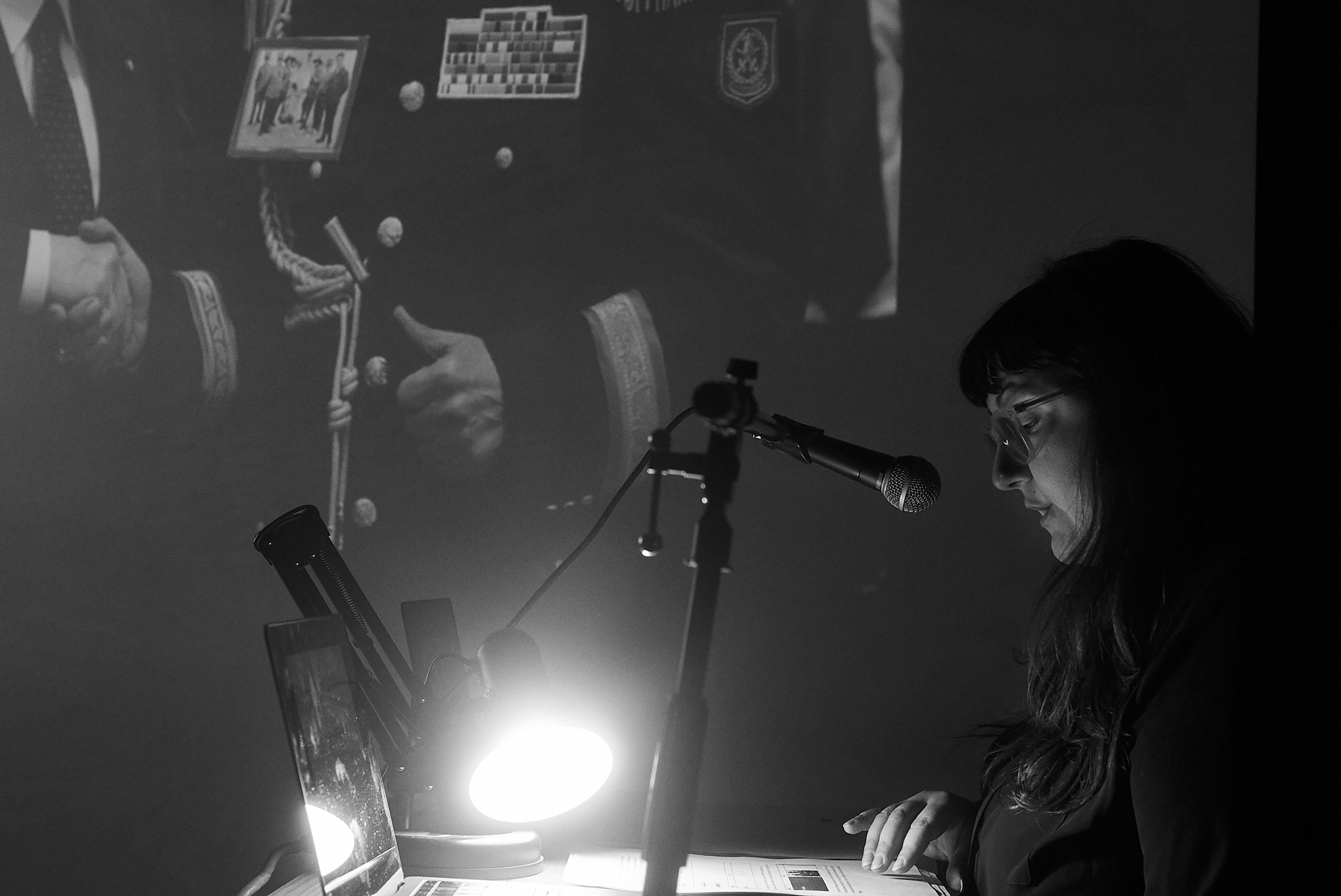 Guests:
Guests:Hasan Özgür Top (online)
Vincenzo Estremo
Participants:Nour Bishouty
Sarri Elfaitouri
Zilan Imsik
Kumjana Novakova
Adrian Schindler
TRANSIT GROUP / Aya Bseiso & Reem Marji
Conceptual note, or a first trigger:
Through a situated investigative methodology rooted in critical whiteness studies, I am interested in exploring the specific imaginary that constitute the Euro-Mediterranean as a hegemonic space, shaped by colonial continuities, neo-imperialist interests, and necropolitical dynamics. As a collective but highly personal exploration of notions of positionality, resistance, and accountability, I wish to scrutinise the uses and abuses of history within nationalist ideologies and international relations across the Euro-Mediterranean, with a focus on media events, political performance and technologies of war, vision, and communication.
Methodologies:
Mixed format - screenings, readings, collaborative activities and 1-1 sessions.
Aim: to collectively develop a creative investigative toolkit.
_
Alessandra Ferrini is a London-based artist, researcher and educator. Experimenting with the expansion and hybridization of the documentary film, her research questions the legacies of Italian colonialism and Fascism, with a specific interest in the past and present relations between Italy and the Mediterranean region. Her work has featured in international exhibitions, including: 5th Casablanca Biennale (2022-23), ar/ge kunst (Bozen, 2022, solo show), Maxxi Museum of XXI Century Art (Rome, 2022), MOMus-Museum of Contemporary Art Thessaloniki (2021), Manifesta 13 Paralléles du Sud (Marseille, 2020), Museion Bozen (2020), Sharjah Film Platform (2019), Istanbul Biennal collaterale (Depo 2019), 2nd Lagos Biennal (2019), Manifesta 12 Film Programme (Palermo, 2018), Villa Romana (Florence, 2018 and solo show 2019), Fondazione Sandretto Re Rebaudengo (Turin, 2018, 2020, 2021 and 2022). Her long-term research-based project Gaddafi in Rome was the winner of the Maxxi Bvlgari Prize 2022 and was the recipient of the 2017 Experimenta Pitch Award at the London Film Festival (British Film Institute). She is a PhD candidate at the University of the Arts London and a Research Fellow at the British School at Rome. Her writing has been published internationally and featured in Everything Passes Except the Past - Decolonizing Ethnographic Museums, Film Archives and Public Space edited by Jana Haeckel for Sternberg Press (2021).
www.alessandraferrini.info
www.instagram.com/alessandra.ferrini
Hasan Özgür Top is a visual artist and filmmaker based in Istanbul. Departing from the context of Turkey and the larger Mediterranean, his research delves into the mechanism of propaganda, exploring the relationship between ideology and iconology. His wore explores the ways in which the relations between image, text, mythology, ideology and theology takes shape in politics. Top held his first solo exhibition in Lima and his works have been exhibited and screened in Istanbul, Berlin, Shanghai, New York and Vienna. He graduated from Marmara University, Faculty of Fine Arts, Painting Department in 2014 and 2019. In 2020, Top received his MA from the Dutch Art Institute.
www.hasanozgurtop.com
Vincenzo Estremo holds a Media and Film Studies Ph.D at Università di Udine and
Kunstuneversität Linz, at the moment, is post-doc at Quadriennale of Roma. In 2022, he spent a research period at the Film-Maker Cooperative in New York thanks to the project
Italian Council and within the program Mekas100! He is a theorist of the moving image
and lecturer of exhibited cinema studies at NABA Milan, he additionally teaches Aesthetics at Università San Raffaele Roma 5. Estremo collaborates with several Art Institution in Europe and co-direct the book series Cinema and Contemporary Art (Mimesis International). He writes for Flash Art Italia and International. His books are: Extended Temporalities. Transient Visions in Museum and Art (Mimesis International 2016), Albert Serra, cinema, arte e performance (Mimesis Edizioni 2018), Teoria del lavoro reputazionale (Milieu Edizioni 2020). Soon will be published his next book: Indistinzione (PS editore 2023).
_ Autumn season 2023
Module IV| 9-19 October
Mentors: Francesca Masoero & Shayma Nader (QANAT) + Nouha Ben Yebdri (MAHAL)
![]()
Guests:Francesca Castagnetti
Participants:Soha Mohsen
Module IV| 9-19 October
Mentors: Francesca Masoero & Shayma Nader (QANAT) + Nouha Ben Yebdri (MAHAL)
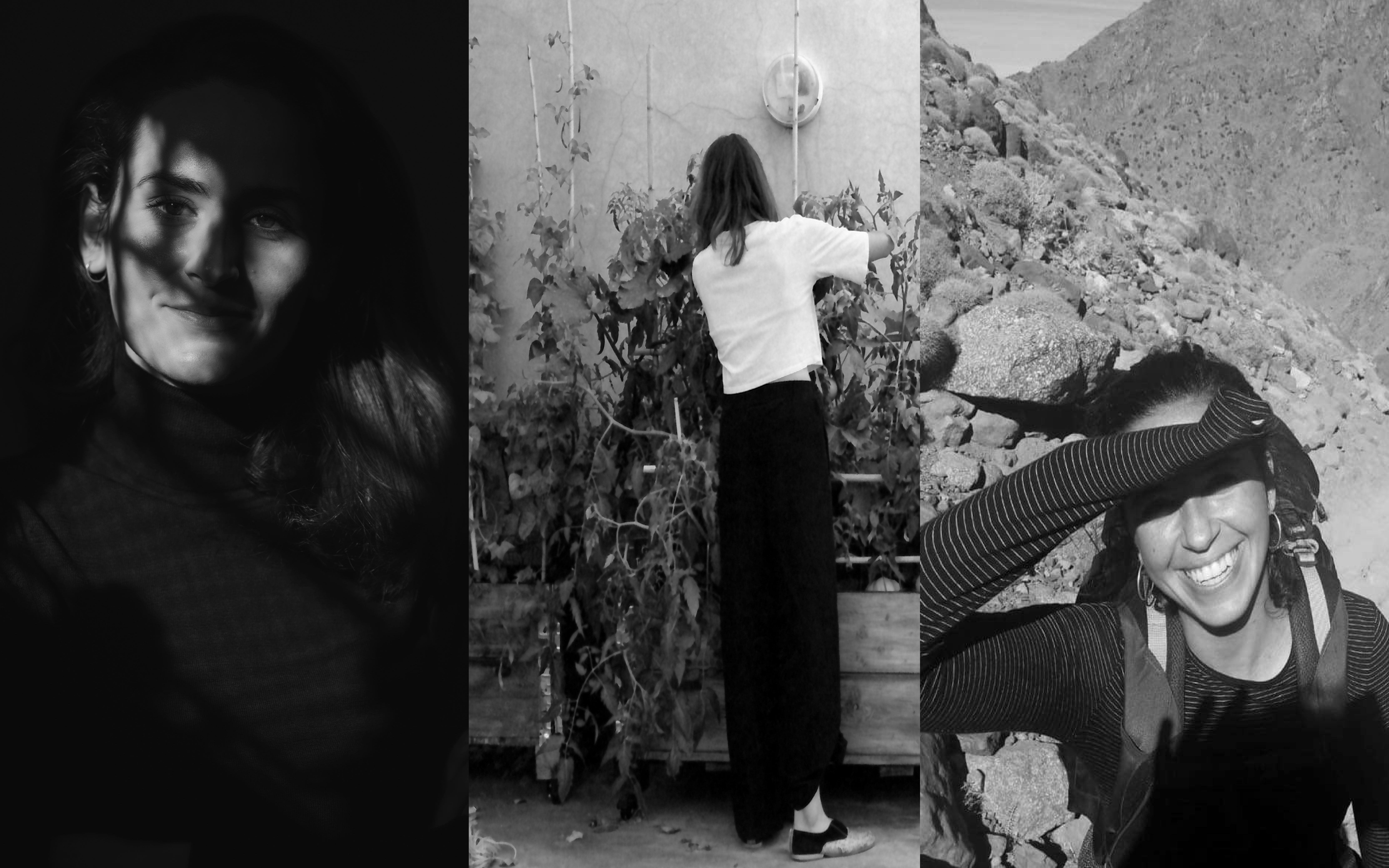
Guests:
Francesca Castagnetti
Antonio Sotgiu
Sakiya (Tareq Khalaf)
Spontaneus Lab (Penelope Volinia &
Nicolò Pagnanelli)
Participants:
Soha Mohsen
Dilşad Aladağ
Hanieh Fatouraee
Irtiza Malik
Shreya De Souza
Sophie Sabet
Nada Rosa Schroer
Nuha Innab
Hiba Isleem
Mare Spanoudaki
Omar Adel Fathalla
Conceptual note, or a first trigger:
“E da quel giorno, l’uomo selvatico abbandonò la valle” / “And since that day, the wild creature disappeared from the valley” is a two-week long module inviting to explore the uncanny, the magical, the political, and the ways we can engage with them through collective and vernacular pedagogical processes.
Once upon a time, the valleys surrounding Biella were populated by magical creatures carrying and sharing wisdoms embedded in and embodied by its soil and seeds, its waters and rocks. Today Biella is often perceived by its inhabitants as a city-archipelago, a fragmented territory notwithstanding its relatively limited geography.
As we witness the loss of collective memories and ways of knowing, societal fractures, environmental depletions and life extractions, this module looks for the political in the fantastical and summons it back, while exploring and testing ways in which we can be-come together otherwise.
Adopting a situated perspective, we will draw from fables/ing, politics and forest ecologies, exploring forms of listening and learning from the territories we inhabit, and how we could bring back the wisdoms and creatures deeply embedded in forest and river ecologies. Based on intimate and sensitive cartographies developed during the two weeks, we will investigate how to design spaces to gather and be together, places to shelter the left-over and the left-aside.
This double module is an experiment in collaboration, bringing together the research, practice and methodologies of QANAT and Silent Pedagogies. Led by Francesca Masoero & Shayma Nader, QANAT is a collective platform exploring the politics and poetics of water and the ways in which manifestations of commoning come to form in Morocco, Palestine and beyond. Initiated by Nouha Ben Yebdri at MAHAL, “Silent Pedagogies” evolves and revolves around modes of transmission in the field of contemporary art drawing from contextual and non-institutionalized cultural manifestations and learning institutes.
Methodologies:
Walking, journaling, storytelling on pluriversality, collective reading, constructing structures/houses, re-enchantment & hospitality to the invisible, cooking, playing…
_
Qanat is a collective platform that explores the politics and poetics of water to reflect and act (up)on the multiple contextual understandings and forms of (re)production of the commons in Morocco, Palestine and beyond. Drawing from various forms of knowledge and acts of resistance and solidarity to dominant environmental narratives and injustices, QANAT aims to create spaces through which we can speculate upon new collective imaginaries to design new spatial and epistemological configurations for our cities. The collective develops archives of resonant reflections and actions that knit together local struggles into transnational patterns for nourishing debates across dispersed localities. QANAT was initiated at LE 18, Marrakech.
www.qanat.org
www.le18marrakech.com
Francesca Masoero works as a curator, cultural organiser and researcher. She is part of LE 18, a cultural space in Marrakech (Morocco), where she initiated QANAT. With a background in critical theory and political economy, she explores notions resistances in multiple forms, including testing collective-making processes within and beyond the art field, and researching the politics and poetics linked to watery worlds and to forms of being together otherwise. Since 2019, she has also been collaborating extensively with the Dar Bellarj Foundation (Marrakech - Morocco).
Shayma Nader is an artist, curator and translator from Palestine. For the past few years, she's been developing and organising workshops and projects focussed on forging and reactivating memories of and in the land through collective walking, listening and fictioning to move towards decolonial and land-centred imaginaries and practices. She is a member of Qanat; a collective platform exploring the politics and poetics of water, and a PhD candidate in artistic research at ARIA at Sint Lucas School of Arts and University of Antwerp.
MAHAL is a non-profit organisation created in Tangier in 2019, by the Tangeroise curator Nouha Ben Yebdri. It has been established as a platform whose principal mission is to respond to the structuring needs of the contemporary art scene in Morocco, by conceiving and practising alternative ways to navigate the challenges specific to the context.
Today, the organisation develops two main projects: Mahal Art Space, an independent exhibition space that promotes and supports emerging artists and cultural practitioners in the early stages of their careers; and Silent Pedagogies, a long-term program for reflection and artistic experimentation around transmission and mediation practices, questioning the objectives, methodologies and impact of actions and activities that accompany and sometimes shape contemporary creation, at both academic and institutional levels.
https://www.instagram.com/mahalartspace/
Nouha Ben Yebdri is an independent curator, founder and director of MAHAL, a non-profit organisation whose mission is to respond to and accompany the needs of the emerging contemporary art scene in Morocco, from its headquarters in Tangier. Her curatorial practice focuses on the reflection and conception of projects around issues related to the development of art spaces, institutionalisation procedures, mediation/outreach protocols, and the impact that these spaces have on their environment; as well as the study of contextual factors that influence the conception of the terms and dynamics that unfold through these processes and places. These efforts are conveyed and put into practice through the programming of the independent space Mahal (or also known as Mahal Art Space) and Silent Pedagogies - بيداغوجيات صامتة , a program that questions the curricula of artistic training in Morocco and analyzes the relationship of art spaces with the different audiences it hosts and works with.
Francesca Castagnetti is an ethnobotanist affiliated with the Centre for Biocultural
Diversity, Kent, and an apprentice in community herbalism working interdisciplinary across ethnobotany, herbalism and the creative fields. She writes, learns and teaches abou plants and land-based practices through apprenticing and ethnographic methods an through the theories of ethnobiology, political ecology and indigenous studies. Throug action-oriented interdisciplinary research and community herbalism she is currently exploring conviviality, storytelling and ceremony as communal meaning-making practices, but also as ways to invite intentional and full sensorial engagement into our relationships
to land.
www.etnobotanica.info
_ Autumn season 2023
Module V| 11-17 December
Mentors: Qalqalah قلقلة
(Virginie Bobin + Vir Andres Hera)
![]()
Guests:
Andrea Ancira García
Participants:Assel Kadyrkhanova
Module V| 11-17 December
Mentors: Qalqalah قلقلة
(Virginie Bobin + Vir Andres Hera)
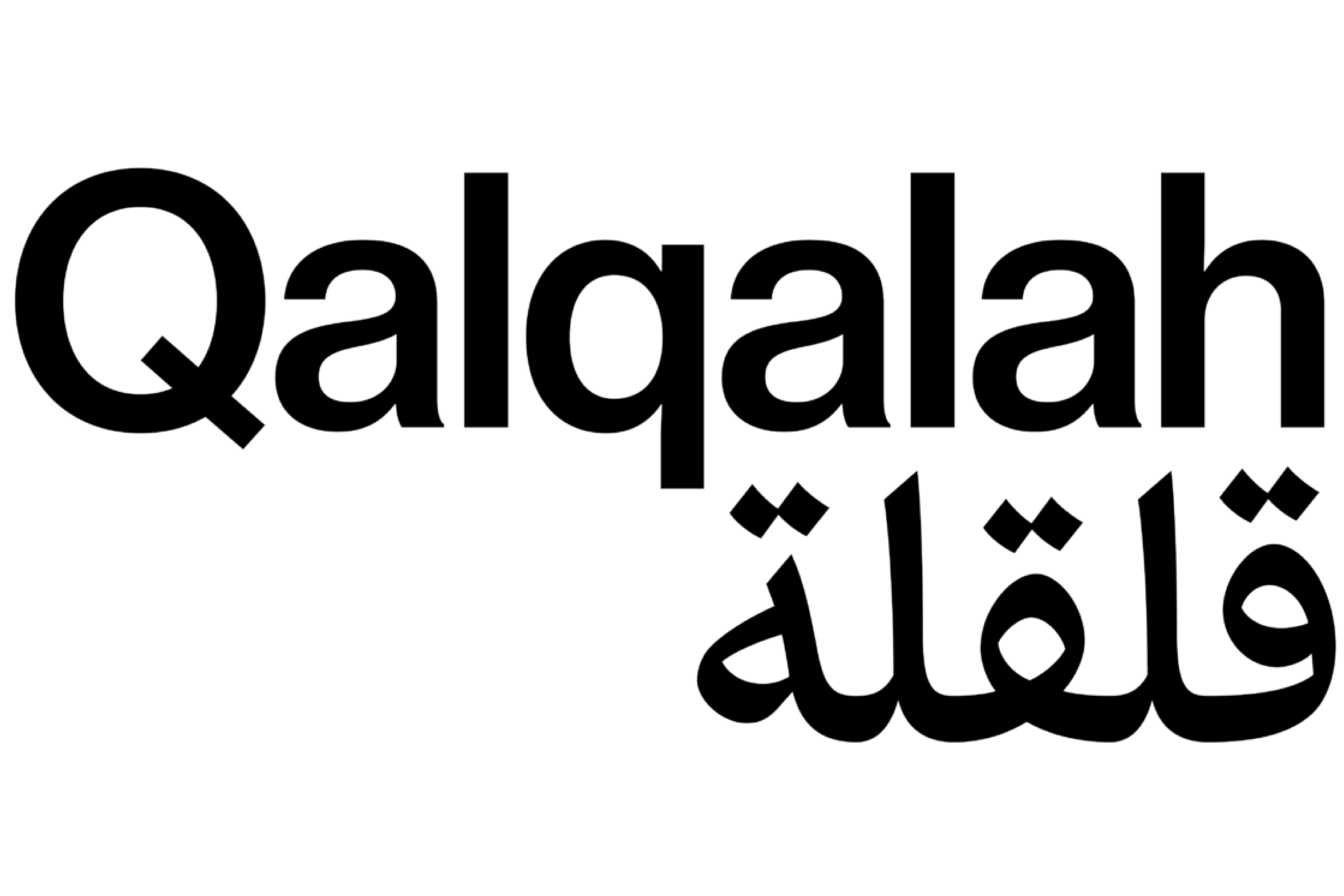
Guests:
Andrea Ancira García
Mirene Arsanios (online)
Anna T.
Participants:Assel Kadyrkhanova
Omar Al-zo’bi
Noemi Alfieri
Danae Io
Nona Markarian
Emma Ben Aziza
Allison Grimaldi Donahue
Engy Mohsen
Tewa Barnosa
Thais Akina Yoshitake Lopez
Joyce Joumaa
Diyae Bourhim
Conceptual note, or a first trigger:
Gestures of Untranslatability /
Conducted by curator, editor and translator Virginie Bobin and artist, film-maker and educator Vir Andres Hera, Qalqalah قلقلة’s module departs from the geographical framework of Neither on Land not at Sea to problematise our situated relationships to the languages we speak, learn, or lose, from both political and affective perspectives. How could we deterritorialise our uses of languages, while acknowledging both the relationships of domination and extraction that they sustain; and their potential to forge paths for deviation, commoning and resistance? During the module, we wish to experiment with collective modalities of writing, translation and editing (texts, images, sound, etc); and with translation and untranslatability as gestures and methods to critically investigate language(s). We will also ask how fiction and storytelling can help us to articulate heterogenous and minor positions with modes of collective enunciation; and shake up identity and linguistic categories. Lastly, we will reflect on the formation of collectives as spaces of care (shelter) and as spaces of risk (conflict) where diverse, heterogenous positions come in contact, affect each other, and transform each other while generating bonds and alliances in the face of shared struggles.
_
Qalqalah قلقلة is an editorial and curatorial platform founded in 2018 in France, which is currently composed of Line Ajan, Virginie Bobin, Montasser Drissi, Victorine Grataloup, Vir Andres Hera and Salma Mochtari. It is dedicated to the production, translation and circulation of artistic, theoretical and literary research in three languages: French, Arabic and English. It relies on translation as a tool for the production and reception of situated knowledge, capable of making visible the relations of power and the possibilities of invention and affection that are at play between languages, temporalities and contexts that are marked by the colonial legacy, conflicts and contemporary revolts.
www.qalqalah.org
Virginie Bobin often works collectively, at the crossroads between curatorial and editorial practices, pedagogy and translation. Her research project for the PhD-in-Practice at the Academy of Fine Arts in Vienna (2018-2023) focusses on the political and affective stakes of translation in postcolonial France. In 2018, she co-founded (with Victorine Grataloup), the editorial and curatorial platform Qalqalah قلقلة. In parallel, she collaborated with artist Mercedes Azpilicueta on her long-term project Bestiario de Lengüitas (2017-2023), leading up to a series of workshops, exhibitions and a publication. She has worked for international artistic institutions, including Villa Vassilieff and Bétonsalon - Center for Art & Research in Paris, Witte de With Center for Contemporary Art in Rotterdam, Les Laboratoires d'Aubervilliers and Performa, the New York Biennial of Performing Arts.
Vir Andres Hera (he/his/they/them) Filmmaker and researcher, born in Yauhquemehcan, Mexico. They conceive their projects as research fields ploughed with the complicity of a community of artists and production sites oscillating between video installations, moving image(s), sound and text pieces. Questioning the multiple relationships between reality and memory, they interrogate vernacular and scholar H/history to invent emancipatory narratives and redefine the weight of colonial history. They graduated from Mo.Co. Art School, from Le Fresnoy Studio National, and is pursuing a PhD at the University of Quebec in Montreal. They have held residencies at La Casa de Velazquez, Triangle-Asterides, among others, they are part of the editorial board of Qalqalah قلقلة and teach at the Experimental School of Annecy-Alps.
Andrea Ancira García is an editor, writer, and researcher. Her practice is situated at the crossroads of art and politics as a site of imagination, (un)learning and affective encounters. Her current research focuses on the role of translation in shaping communal perspectives of life and memory. She also works with archives and the affective economies they produce and circulate when generating and exchanging alternative narratives of a shared history. Since 2017 she co-created the publishing platform tumbalacasa ediciones. She is currently a fellow of the Jumex Contemporary Art Foundation and a PhD Candidate at the Academy of Fine Arts in Vienna.
Mirene Arsanios is the author of the short story collection, The City Outside the Sentence (Ashkal Alwan, 2015), Notes on Mother Tongues (UDP, 2019), and more recently, The Autobiography of a Language (Futurepoem, 2022). She has contributed essays and short stories to e-flux journal, Vida, The Brooklyn Rail, LitHub, and Guernica, among others. Arsanios co-founded the collective 98weeks Research Project in Beirut and is the founding editor of Makhzin, a bilingual English/Arabic magazine for innovative writing. She teaches at Pratt Institute and holds an MFA in Writing from the Milton Avery Graduate School for the Arts at Bard College. Arsanios currently lives in Brooklyn, New York.
www.mirenearsanios.com
Anna T. (PhD) is an islander. She works as an artist, educator, and curator in a landlocked country. She has taught at the Academy of Fine Arts Vienna, the University of Art and Design Linz, and the University of Vienna. Her artistic practice and scholarly work draw from poststructuralism, queer theory, decoloniality, peripherical knowledge, aesthetics, and affect. Since 2003 she has curated and participated in numerous group and solo exhibitions and new media festivals in Europe, the Americas, and Australia. She is the author of Opacity – Minority – Improvisation: An Exploration of the Closet Through Queer Slangs and Postcolonial Theory.
www.annatee.co.uk
_ Spring season 2024
Module VI| 8-15 April
Mentors: HUNITI GOLDOX
(Areej Huniti & Eliza Goldox)
![]()
Guests:
Sallisa Rosa (online)
Participants:Monya Riachi
Module VI| 8-15 April
Mentors: HUNITI GOLDOX
(Areej Huniti & Eliza Goldox)
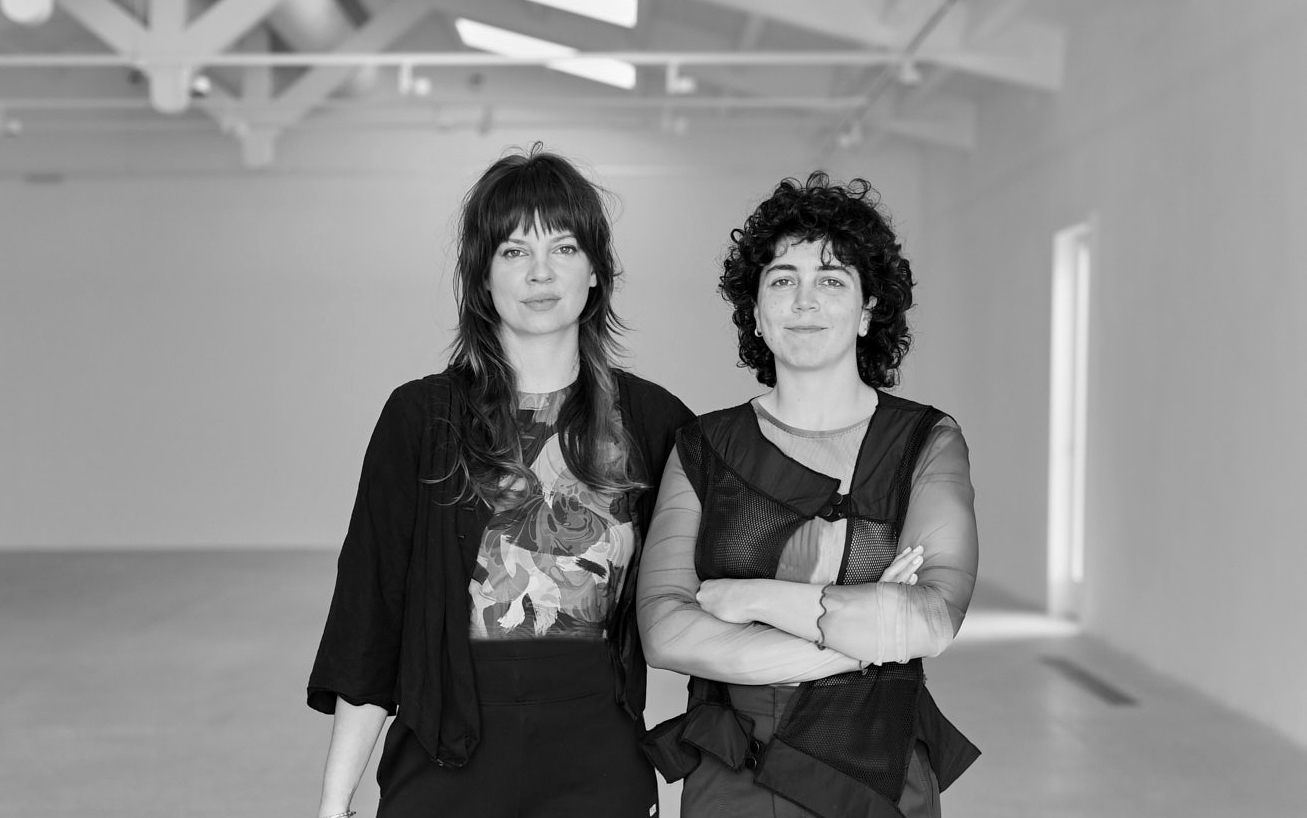
Guests:
Sallisa Rosa (online)
Aziz Aissaoui / El Warcha
Participants:Monya Riachi
Viviane Tabach
Batoul Faour
Amanda Assaley
Mudassir Sheik
Arie Amaya-Akkermans
Aron Rossman-Kiss
Maria Cynkier
Conceptual note, or a first trigger:
The Rise and Fall of Water /
When the Suhail star (Canopus) rises to the mid-level of the night sky, a water clock woven from the threads of celestial waters emerges. Its emergence coincides with the hatching of a blue Eisvogel bird by the banks of the Pleisse river. The very essence of the water-clock pulsates with the sky’s liquid offerings and the deep earth’s molten rocks. It has 15 elements, forming an upright circulation. At the pinnacle, a copper tipping bucket awaits to receive the water flow, at the cradle of the bucket rests an onyx mouthpiece. Through a hair-thin orifice, a cascade of water emanates. Its destination? A vessel (a lake).
A riddle unfurls as a syphon, akin to a river, commences a silent dialogue. The vessel overflows, and the journey continues, waters spill into a float-chamber designed with precision to regulate the water level. Inside this chamber rests a wooden float platform, which ascends with the rising water level. Perched atop the float platform is a carefully arranged assembly of stones and fish bones, on top of it a kingfisher bird figurine clutching a fishbone in its beak points at a sheet divided into 12 equal segments - a manifestation of daylight’s division.
The water’s flow persists, as the float rises, a connected siphon engages with a rotating disc. When the vessel empties, the disc rotates, its dynamic interaction is further augmented by a wheel. As the clock choreographs its intricate movements, any excess water gracefully cascades from the wheel’s motion into a lower vessel, echoing the cycle of water’s journey from the Equatorian lake to the sea. This lower vessel becomes a reservoir of the surplus water, drawing a parallel between the clock’s mechanics and the vast expanse of the world’s oceans.
Within the delicate ecosystem of the water clock, flora awakens beneath the surface, their tendrils embracing liquid realms with a quiet determination. Those who were observing the night sky reported seeing submerged beings thriving within the confines of the clock.
With each cycle, a metamorphosis takes place—a transformation not only within the clock’s mechanics but within its elements, resonating with the elemental-forces that shape our shared present.
Led by artist duo HUNITI GOLDOX (Areej Huniti & Eliza Goldox), Module VI – Spring 2024, The Rise and Fall of Water, contemplates the intersectionality of lines – infrastructures that impose certain interpretations of the world while rendering others invisible. In 2023, the duo began researching ancient timekeeping devices reliant on the fall of water, like the water clock, which works by measuring time through the fall of water. The project critically engages with colonial perspectives examining how territorial dominance manifests through human-made structures like time zones, dammed rivers, and aridity lines. It provokes reflection on scientific and indigenous forms of knowledge, as well as the fates of immeasurable objects, subjects, and relations within the natural world.
Participants in the module engage in re-enactments of the water clock, as they are invited to explore narratives crafted by intertwined entities of water, stones, trees, and birds. This frame facilitates a shift towards an elastic territory that transcends traditional temporal confines. Through it, the module seeks to contemplate diverse methods of world-building that prioritise the interconnectedness of elemental forces, diverging from the dominant doctrines of industrialisation and accumulation.
_
HUNITI GOLDOX is an artist duo composed by Areej Huniti and Eliza Goldox. The practice of HUNITI GOLDOX explores how political systems, transitions and violence are affecting water bodies and landscapes. Through contextual examinations of geopolitical realities, marginalised oral histories and mythologies they create films, videos, VR-works, installations, conversations, texts, in addition to formats that can involve different voices and beings, such as workshops, excursions and interventions. This stems from the desire to create moments for collective imagining and re-imagining to collapse dominant narratives and fixed geographies. More specifically they engage with the notion of enforced mutation as a way to attend to present social and ecological struggles while demanding speculative answers to confront systematic oppression. They started this with a project on the buried water stream in the centre of Amman/ Jordan then they extended to the swamp lands and mediterranean coast of Tunis/ Tunisia, the artificial lake land of Leipzig, the urban development projects around Tirana River and the Vistula River in Poland.
Their work was exhibited at the Institute for Postnatural Studies, Madrid (2023); Hauser & Wirth, Menorca (2023); TBA Academy/ Ocean Uni, Madrid (2022); Tirana Art Lab, Tirana (2022); D21, Leipzig (2021); Sheffield Film Festival, Sheffield (2021); School Of Waters/ Biennale Mediterranea, San Marino (2021); SomoS Art House, Berlin (2020); SPARC* Spazio Arte Contemporanea, Venice (2020); Darat al Funun, Amman (2019); MMAG Foundation, Amman (2019), The Jordan National Gallery of Fine Arts, Amman (2019) among others.
Sallisa Rosa is from Goiás - Brazil, and is currently doing her artistic residency at the Rijksakademie in Amsterdam. She works with art as a path based on intuitive experiences linked to fiction, territory and nature. Furthermore, it focuses on the themes of memory and forgetting and strategies for creating the future. The artist has a special interest in creating large-format installations in public and institutional spaces.
Sallisa works with the earth in various materials, such as planting, clay and ceramics, and also moves between photography and video, performance and more recently drawings. In her trajectory, the commitment to artistic practices aimed at collective constructions is central, in order to unfold actions that culminate in sharing knowledge.
El Warcha – meaning “the workshop” in Arabic – opened its doors in 2016 in the Medina, the old town of Tunis. Its goal is to foster collective action and learning by developing art installations and urban furniture. El Warcha initially focused on devising practical elements with local residents of all ages, designing and building planters, playgrounds, bins, or lighting. Over time, the collective developed alternative pedagogical methods based on participatory design, intended to allow for mutual growth and reimagining our living environment. El Warcha thus grew into a space for collective movement between discussion and making. By favouring experimentation as a form of reflection and knowledge exchange, the aim is to put everyone on equal footing, for example through conceiving intuitive assembly techniques that do not necessitate prior technical mastery and use commonly available material to allow everyone to test their ideas and make prototypes, but also to fail and start over.
In 2018, El Warcha began expanding, as some of its team members moved abroad. The first workshop outside of Tunisia was founded in London, followed by others in Lisbon, Davis, and Nefta, in the Tunisian desert. El Warcha grew organically through this international multiplication, forming an engaged community that shares a common vision despite the distance and diversity of contexts. The challenges of organising across borders and experiential divides regularly bring about points of convergence between these trans-local realities.
Aziz Aissaoui works primarily with sculpture, installation, and video. Through these mediums, he translates and channels phenomena from the natural and built environment, and creates spaces in which people can interact with the work and its context. His background as a designer has shaped his practice by offering him the tools through which he relates to art—from its social dimensions to its methodologies. Aziz is part of the collective El Warcha.
_ Summer season 2024
Module VII| 22-28 May
Mentors: Mafe Moscoso & Claudia Delso Carreira
![]()
![]()
Guests:Lizette Nin
Participants:Calvin Walds
Module VII| 22-28 May
Mentors: Mafe Moscoso & Claudia Delso Carreira
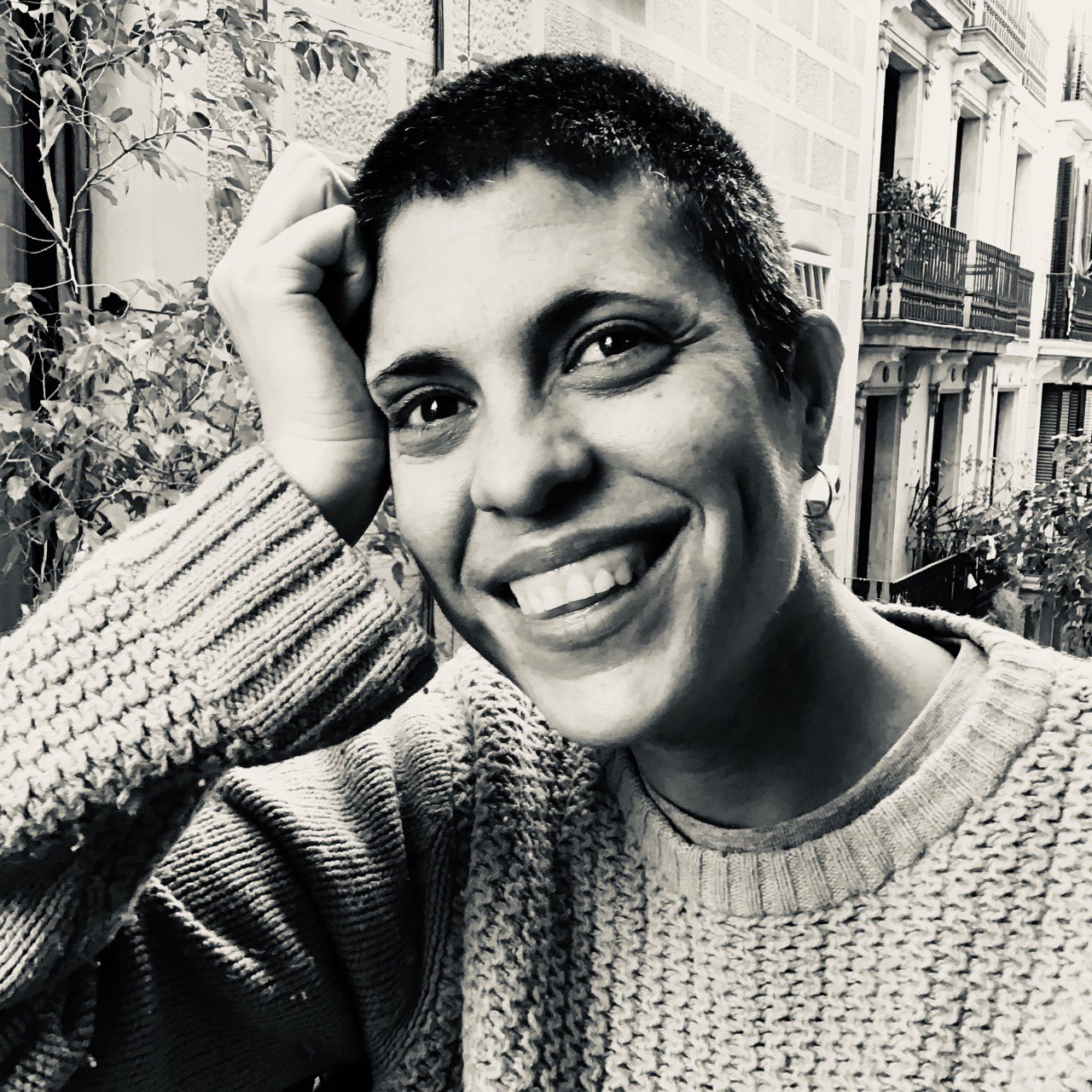
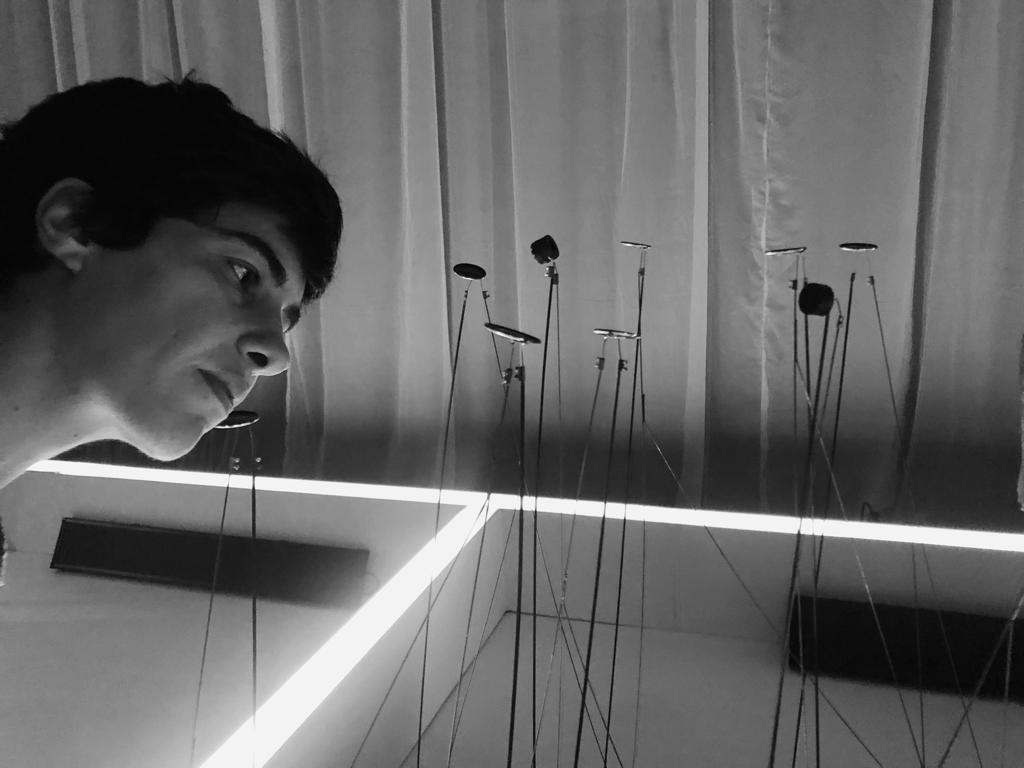
Guests:
Lizette Nin
Diego Posada Gómez
Verónica Yuquilema Yupangui (online)
Daniela Medina Poch (online)
José Luis Jácome Guerrero (online)
Participants:Calvin Walds
Adam Moore
Gloria Frigerio
Sonja Jristina Bjelic
Tau Luna Acosta
Nabil Aniss
Kmar Douagi
Natalia Valencia Arango
Lorena Salamanca
Luana Carp
Carlota de Torregrosa
Charlotte van Braam
Conceptual note, or a first trigger:
Todas las aguas son del agua /
All Waters Belong to Water
De la tierra nacemos, from earth we are born; a la tierra regresaremos, to earth we shall return; a dar lo que ella nos dio, to give back to her what she has given. “Yes,” I say to myself, “the earth eats the dead, la tierra se come los muertos.”
– Gloria Anzualda, Light in the Dark/Luz en lo Oscuro. Rewriting Identity, Spirituality, Reality (2015)
/// The decision to migrate implies the end of the world for the person who has made the decision to leave behind their land, their family, their food, their life as it was until that moment. Migration represents the end of one world and the beginning of another ///
The starting point of our proposal is that we live in Europe in a situation of cognitive darkness that affects our ways of understanding the relationship between life and death and, consequently, our ways to imagine post-apocalyptic scenarios. Therefore, we believe that incorporating non-Western ontologies and imagination through fiction into artistic research opens up the possibility of a deeper understanding of how we think what we think, as a condition for imagining forms of knowledge beyond ontological realism.
It is known that the Mediterranean Sea has been subjected to an unprecedented ecological pressure that has led to its collapse. Part of the responsibility for this collapse lies in a capitalist/colonial vision of the Mediterranean as a spiritless being, a body to be exploited and an object separated from the subject. During modernity, in Europe, “nature” is separated from “culture” and life from death. The hidden face of this process is the coloniality of human and non-human and the separation between life and death. “Nature” becomes an “outside”, that is, an object of exploitation, plunder and domination – just like all those subjects who were outside the logos (De la Cadena, 2018). On the other hand, Despret (2021) explains that, during modernity, a conception of mourning was also imposed in Europe that rests on the idea that when someone dies, they no longer have any form of existence. There is a conception of death and life as everything or nothing. In this way, it can be stated that the collapse of the Mediterranean is a post-apocalyptic capitalist/colonial scenario, because it is an ecosystem that has suffered a radical transformation of the conditions that allow its existence while representing the materialisation of a (Western) cosmology that interprets that the sea has died and that death is the end of life.
Methodologies:
Our desire is to accompany and take care of a collective process focused on developing ways of speculative research (listening, walking, collective reading and cooking, drawing, assembling rituals). The idea is to imagine, together, scenarios in which present, past and future come into play in order to generate alternative narratives to the hegemonic European view that see death as not accompanied by processes of rebirth.
We were born
We flourished
We die
We were reborn
We flourished
We migrate
_
Mafe Moscoso was born in a banana republic (Ecuador), she works and researches between/through/for/with/without the intersections between ethnography, writing and art, from an anti-racist and trans-feminist perspective. She is currently a lecturer and researcher at BAU, Centre Universitari d'Art i Disseny (Barcelona). Her main areas of focus are memory, colonialism, migrations and ethnographic fiction. Artistic research grand Hangar-Sabadell winner (2023) with the project Un oceáno (por) venir: etnoficciones cuir. Author of the fiction book La Santita (Consonni, 2024), the essays Hostal España. el gesto hospedante, una etnografía hospedante (Mr. Griffin, 2024), Biografía para uso de los pájaros: infancia, memoria y migración (2013) and the poetry book Desintegrar el hechizo. Versitos anticoloniales ( 2021), among others.
Claudia Delso Carreira is an activist, researcher and cultural project manager. She works as a consultant at Barcelona Research Institute (IDRA). Art Historian. Postgraduate in Cultural Management and International Cooperation, Postgraduate also in Technopolitics and Rights in the Digital Age. She was the co-coordinator of the First International Circus Festival in the Occupied Territories in Palestine in 2011 and has worked for many years with the saharaui women in the refugees camps in Tindouf (Algeria). As an independent professional she has worked in interdisciplinary cultural projects such as Mov-s around the politics of the body or the International Community Arte Festival ICAF Rotterdam, 2014. She currently co-coordinates the Seminar "Rethinking the Museum: institutional practice and mezzopolitics" within the Program in Critical Museology, Artistic Research Practices and Cultural Studies "Tejidos Conjuntivos" of the Museo Nacional Centro de Arte Reina Sofía (Madrid).
Lizette Nin is a queer Black artist straddling Barcelona and Dominican Republic, channels her Afro-descendant roots into a multidisciplinary art practice. Through video, food, drawing, and printing, Lizette amplifies the voices of marginalized social groups, shedding light on overlooked struggles. Her extensive track record includes exhibitions in Barcelona, Panama City, Madrid, and Berlin, showcasing her commitment not only to art but also to advocating for the inclusion of Black women in Spain. Lizette's art becomes a conduit for connection and reflection, inviting viewers to explore diverse experiences.
www.lizettenin.wordpress.com
Diego Posada Gómez is a colombian artist and researcher. Doctor of Fine Arts. He studied Fine Arts at the Pontificia Universidad Javeriana in Bogotá. Since 2015 he has been living in Spain, where he completed the Masters in Research in Art and Creation at the Complutense University of Madrid, the Independent Studies Program at MACBA, and the Doctorate in Advanced Studies in Productions and Artistic Studies at the University of Barcelona. The vital issues that cross his artistic and research practice are war as a mode of government, a containment framework and producer of discourses of the Colombian nation, and the intersections of this war-cultural framework with sexual and gender dissidence. His migratory experience has led him to approach sodomy as a colonial discourse initiating sexual regulation in Abya Yala, and diaspora and exile in relation to sexual and gender dissidence. Dissident methodologies are part of his practice and research interests. Since 2021 he is part of the sexi-liadxs collective (in residence at La Escocesa 2021-2022). His recent projects have received a research and experimentation grant from La Escocesa (2018), creation awards from the Sala d' Art Jove (2019 and 2020), and a grant for the creation of the Guasch Coranty Foundation (2019 -2020), Artistic Research Grant Generalitat de Catalunya (2023).
www.diegoposadagomez.com
Verónica Yuquilema Yupangui, Kichwa Puruwa, ia a lawyer with experience in Human Rights and Legal Pluralism. She worked as a legal advisor for INREDH with indigenous, peasant and Afro-Ecuadorian communities. She is currently a PhD candidate in the Post-Colonialism and Global Citizenship Program at the University of Coimbra and the CES Center for Social Studies in Portugal and is president of the Human Rights NGO ( INREDH). She also was a professor at the University of Indigenous Peoples and Nationalities Amawtay Wasi in Quito, Ecuador.
Daniela Medina Poch investigates how unofficial histories and interspecies entanglements contribute to the conception of plural ecologies. Through an expanded listening to whom and what has been systematically excluded, her practice aims to question the supposed universality and impartiality of certain ecological discourses, and aims to alter some of the hierarchies sedimented in them by proposing subversive knowledge flows. Medina Poch works have been exhibited internationally in venues such as ArtFest, Uruguay 2023; Museo de Arte Moderno de Bogotá 2023 and 2021; Center for Contemporary Art, Berlin, 2023; The Line, UK, 2023; Fridays for Future-Documenta Fifteen Kassel, 2022; TBA21-Academy 2022; XXII-Bienal de Cerveira, 2021; The I Listening Bienial, Berlin, 2021; SAVVY Contemporary The Laboratory of Form-Ideas, Berlin, 2020, XIV ARTBO Fair, Bogotá 2018; FLORA ars+natura, Bogotá 2018; LOOP Festival, Barcelona, 2016, amongst other. In 2023 she was awarded the Goldrausch Fellowship, the DAAD STIBET scholarship and the Rhizome Microgrant. Her works are part of the permanent collections of the Museo de Arte Moderno de Bogotá, and the digital platforms of Collecteurs and Museo de Memoria de Colombia in Bogotá. She has an MA from the Institute for Art in Context at the Universität der Künste Berlin.
www.danielamedinapoch.com
José Luis Jácome Guerrero is a polymath artist, Master in Photography and Society in Latin America, Bachelor of Visual Arts from UArtes Internacional, and Graphic Designer. He is the Creative Director of the Central Dogma Collective, a member of the Autonomous Astronauts Association (AAA), and the Association for the Development of Ibero-American Music (ADIMI). He is the author of the book Archivomancia and the concept of Khipunk, co-creator of the FanzinotekaEc archives, and the archaeology of Ecuadorian comics. He is the Creative Director and Curator of music festivals, film, public art, and the rural residency Pujinostro. He has exhibited his visual, performative, and sound works in cultural spaces around the world, including the Queens Museum and the Brooklyn Academy of Music in New York, and the Center for History of Zaragoza in Spain. As a researcher, he has shared his knowledge and experience in workshops, talks, and conferences in various cities in Ecuador, Mexico, Argentina, Peru, Bolivia, Colombia, and the United States, as well as publishing in magazines, blogs, and specialized pages in music, art, and science fiction.
_ Summer season 2024
Module VIII| 27 June-3 July
Mentors: Fehras Publishing Practices (Nancy Naser Al Deen, Sina Ahmadi, Sami Rustom)
![]()
Guests:
Tzeshi Lei
Mana Tashakorinia
Module VIII| 27 June-3 July
Mentors: Fehras Publishing Practices (Nancy Naser Al Deen, Sina Ahmadi, Sami Rustom)
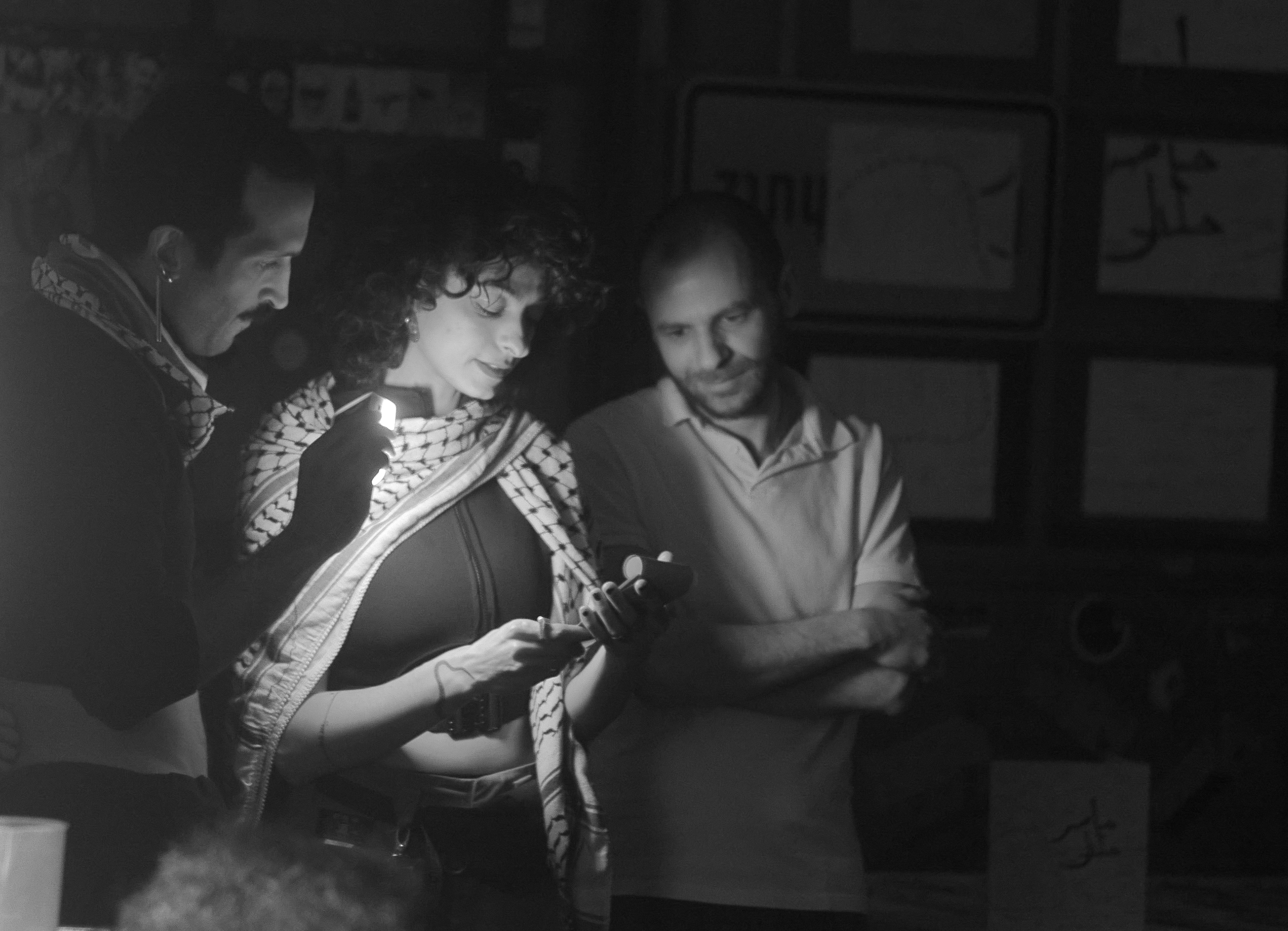
Guests:
Tzeshi Lei
farkhondeh shahroudi (online)
Participants: